- Home
- Florida History
- Florida Heritage Sites
- Beluthahatchee Park
BELUTHAHATCHEE PARK
By Mike Miller November 1, 2025
Beluthahatchee Park in Fruit Cove, Florida is more than a quiet four acre patch of trees and water along State Road 13 surrounded by upscale homes: it is a place where history decided to sit still for a moment.
The name “Beluthahatchee” comes from a term used by author Zora Neale Hurston to describe a mythical “Florida Shangri-La,” a place where people are never judged or cast out. That spirit fits the beliefs of the men who lived here: Stetson Kennedy and Woody Guthrie.
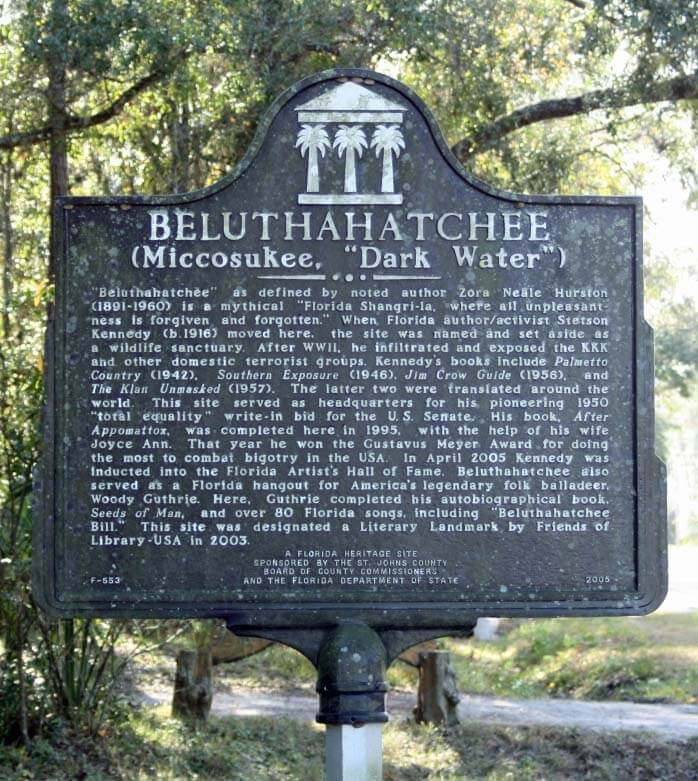 Florida Heritage Site Plaque Near Fruit Cove
Florida Heritage Site Plaque Near Fruit CoveStetson Kennedy was a Florida-born writer, labor activist, and undercover investigator of racist and extremist groups including the Ku Klux Klan.
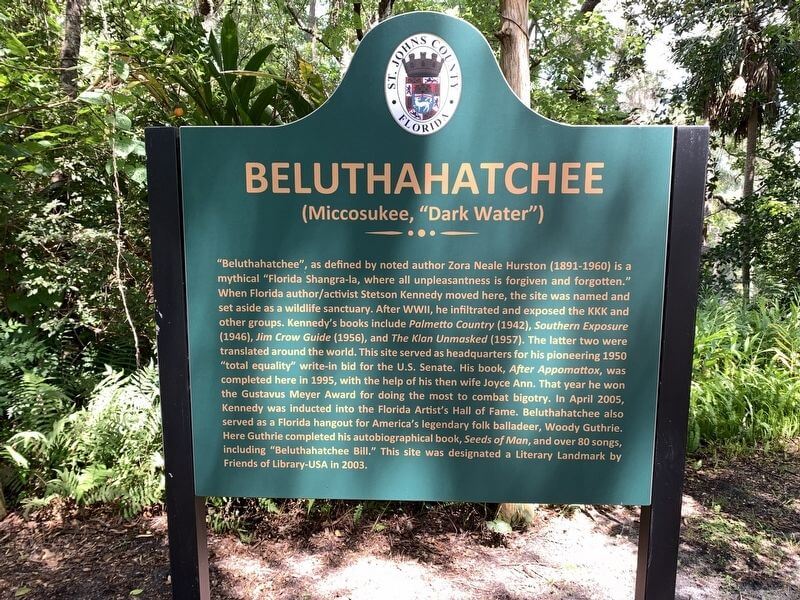 St. Johns County Heritage Sign
St. Johns County Heritage SignHis most famous book is "Palmetto Country" written as a book describing the culture and folklore of people who lived in North Florida and South Georgia.
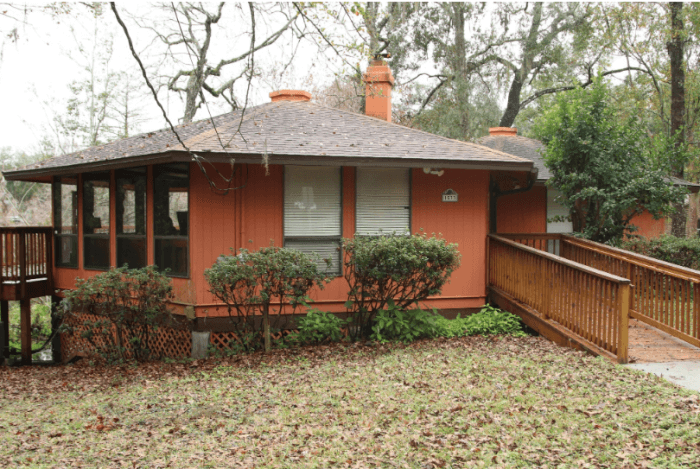 Beluthahatchee Park Building
Beluthahatchee Park BuildingThe book was published in 1942 as a result of his work for the Florida Writer's Project of the Works Progress Administration from 1937 to 1942.
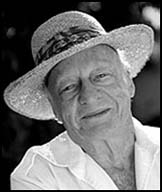 Stetson Kennedy
Stetson KennedyDuring the 1940s he infiltrated the Ku Klux Klan and passed their secret codes, rituals, and plans to law enforcement, journalists, and even to the writers of the Superman radio show, who used the material in episodes that mocked and exposed the Klan to a national audience.
Kennedy later told that story in his 1954 book “I Rode With the Ku Klux Klan,” sometimes published as “The Klan Unmasked.” He spent much of his later life at Beluthahatchee.
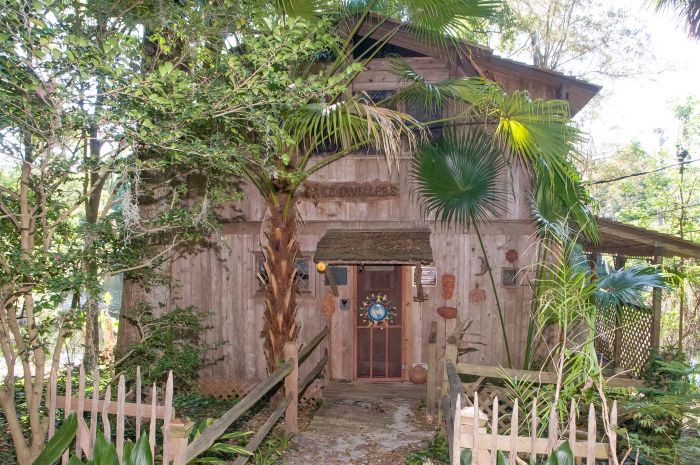 Lake Dwelling at Beluthahatchee Park
Lake Dwelling at Beluthahatchee ParkWikimedia Commons
There he wrote, organized, and welcomed visitors who were interested in civil rights, folklore, and Old Florida storytelling.
Beluthahatchee also became home to one of America’s great folk musicians: Woody Guthrie. Guthrie, known for “This Land Is Your Land,” stayed with Kennedy in the late 1940s and early 1950s.
While living at Beluthahatchee, Guthrie wrote songs that went beyond the wide-open West and Dust Bowl stories he’s famous for.
He wrote about Florida’s working people such as citrus pickers, shrimpers, and turpentine workers. He also wrote protest songs aimed at Jim Crow segregation prevalent back then in the South.
Guthrie even composed anti-racist songs targeting a Florida sheriff accused of brutality. Those lyrics, sharp as barbed wire, were meant to embarrass the powerful and defend the powerless.
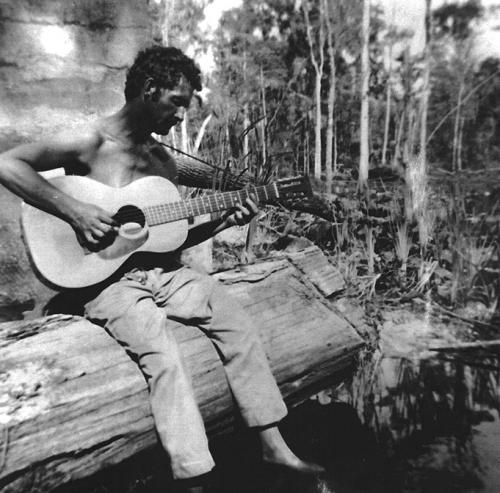 Woody Guthrie at Beluthahatchee
Woody Guthrie at BeluthahatcheeBecause of that long connection, Beluthahatchee Park is now recognized as a literary landmark.
It is one of the very few places in the United States officially associated with Woody Guthrie’s life and work, and it is deeply connected to Kennedy’s legacy as an author and activist.
The site includes the house, lake, and surrounding woods, giving visitors a glimpse of what old North Florida felt like before the boom of development pushed south from Jacksonville.
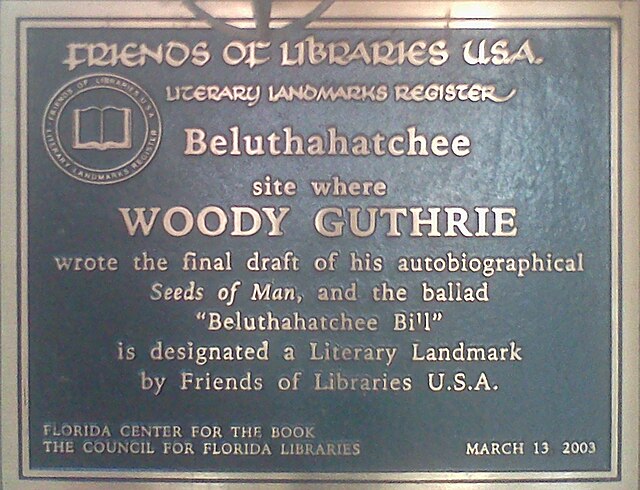
Today Beluthahatchee Park is small, quiet, and easy to miss if you’re driving too fast. But it tells a big story. It reminds us that Florida history is not just beaches and tourists. It has its own unique culture and history.
Address: 1523 SR 13 N, Fruit Cove, FL 32259
Just over 20 miles from Jacksonville.
Beluthahatchee Park Website
LOCATION MAP BELUTHAHATCHEE PARK

Florida is the fastest-growing state in the United States and also the fastest-changing. If you see anything in this article that has changed or is in error, please let me know.
Thousands of Florida fans subscribe to our free daily Ezine, Florida Heritage Travel and we have 130,000 followers on Facebook.
By Mike Miller, Copyright 2009-2026
Florida-Back-Roads-Travel.com
Florida Back Roads Travel is not affiliated with or endorsed by Backroads, a California-based tour operator which arranges and conducts travel programs throughout the world.
